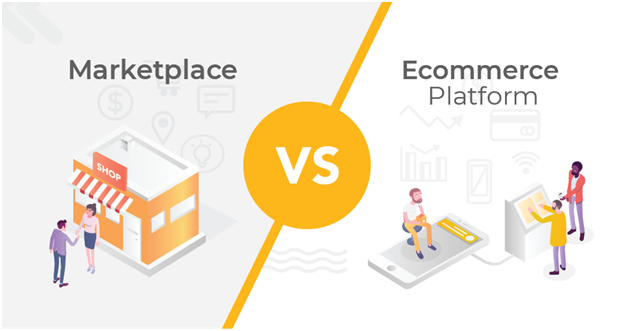Marketplace vs Ecommerce – Which is Better?

Posted on 2021-02-12 13:21:10, by Seawind
What is the marketplace?
In the most simple terms, a marketplace is a website where the products offered come from multiple sellers. The variety of assortment a marketplace offers is exactly what attracts customers – just like a shopping mall does in real-life.
Setting up your store on most marketplaces is disarmingly simple – some even let you sign up with your account.
What about the process of selling on a marketplace?
There are three parties involved – the vendor, the customer, and the marketplace administrator.
As Example:
The company takes care of maintaining the website, invests time and money in attracting potential clients, and offers a safe shopping and payment process. However, once the sale is finalized, the products aren’t shipped by the marketplace – all items are stored and sent by the seller.
Now, how do marketplaces make money? As you’ve likely guessed, they either charge a commission for each transaction, a flat membership fee, or offer a combination of the two.
The benefits of selling on marketplaces speak especially strongly to sellers who are taking their first steps in sales and those who love the convenience of never having to worry about website performance, maintenance, and on-site shopping experience. They are also the first choice for those whose sales aren’t big enough to make building their own online store an appealing perspective.
What is an e-commerce website?
E-Commerce is a website where a single vendor sells his/her products/services to multiple customers. As the website belongs to the vendor, there are only two parties involved in the sale process – the seller and the buyer.
Unlike marketplaces, which make sure their sites are always robust and up-and-running, e-commerce websites need to be set up and maintained by the seller.
Sounds like something extremely complicated? It doesn’t have to be! Setting up your own online store doesn’t mean you have to code it from scratch. There are many e-commerce platforms that offer multiple predefined features and templates to choose from.
The top e-commerce platforms we recommend that you look into are WooCommerce, Magento, and Shopify.
Recommending that you consider the specificity of the industry and business you operate in. Do you work in a niche that could potentially require you to create a website with custom features?
Also, what is the expected volume of sales you’re looking to handle?
Ecommerce websites are built to keep track of inventory, which could get incredibly confusing if you were to handle multiple sales from a marketplace.
Own eCommerce vs Marketplace Selling Platform – Key differences to consider
Now that we’ve explained how marketplaces and e-commerce websites work, it’s time we take a look at how these two solutions compare against vendors’ top concerns.
Here’s a breakdown of how they function in terms of website traffic, managing inventory, attracting potential customers, as well as time to launch.
|
|
MARKETPLACES |
E-COMMERCE |
|
TRAFFIC |
The target audience is bigger as marketplaces offer a huge choice. |
The store owner needs to attract traffic to the website. |
|
MARKETING |
Support sellers marketing efforts through attracting, nurturing, and engaging leads on the site. |
The seller needs to take care of lead generation/nurturing him/herself. |
|
INVENTORY |
Don’t run inventory. |
Ecommerce sites run inventory. |
|
TIME-TO-LAUNCH |
Quick to set up. In most cases, you can do so in a day or less. |
You set up the entire site yourself; it can be time-consuming upfront. |
Marketplaces are a great starting point for e-commerce beginners; they allow you to cut down the costs, risks, and time needed upfront to create a store.

